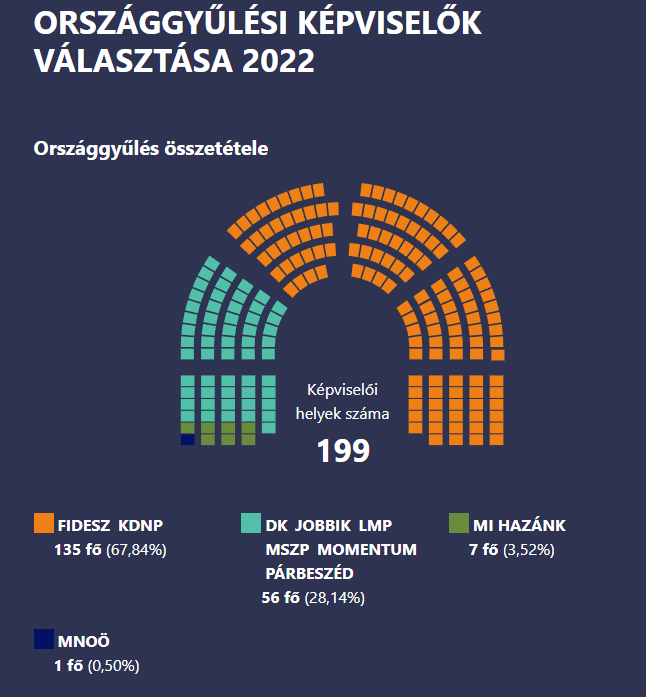Election night in Hungary was as good as it could be for Fidesz and proved as awful as possible for Péter Márki-Zay’s United for Hungary. Not only did Fidesz sail to victory, but rather helpfully, a small anti-vaxxer hard-right party called Mi Hazánk — formed by former Jobbik members that disagreed with a turn to more moderate politics — managed to cross the minimum 5 percent threshold required for parliamentary representation. That’s not something any pollster predicted in the last weeks of the election. I say that Mi Hazánk will prove useful to Fidesz because the ruling regime can now point to a far-right wing bogeyman and return to the strategy it once used with Jobbik to convince people that a vote for Viktor Orbán’s movement is the only way to keep the extremists out. Of course, anyone with sense and knowledge knows that the Mr. Orbán’s party is the home of extremists — and oligarchs.
We’ll have to wait a few days for the final results — notably mail-in ballots and votes cast at diplomatic missions abroad. But the results we have now are abundantly clear (popular vote and seat count):
- Fidesz-KDNP: 53% (135 seats)
- United for Hungary: 35% (56 seats)
- Mi Hazánk: 6% (7 seats)
- German minority: –% (1 seat)
Mr. Márki-Zay conceded defeat in a speech given in Budapest’s City Park. “I’m as devastated as everyone else, I don’t want to hide my disappointment — we never thought this would be the result. There’s no way around it,” he said. “We acknowledge the victory of Fidesz. We do not dispute that Fidesz won this election. But many dispute that it was a democratic and free election,” he added.
And indeed, it wasn’t. We’re not only talking about gerrymandering, but also about the massive media imbalance that skews to Fidesz, the partisan pay-offs and the Fidesz clientele — people whose livelihoods and financial fortune depend on the regime. As a state, Hungary is hollowed-out. There’s Fidesz — and, more accurately — there is Mr. Orbán and little else. Opposition politicians, for instance, rarely appear on taxpayer-funded public television — a platform that is nothing more than a conveyor of party propaganda for Fidesz.
Opposition politicians, activists and voters approached the polls with resolve and guarded optimism. The parties of United for Hungary also managed to stay on message and to avoid any major faux pas or in-fighting, despite the unprecedented political diversity of this electoral coalition. For 12 years, it was often repeated that only by complete unity can the opposition unseat the Fidesz regime. Finally, this unity — from Jobbik all the way to the Democratic Coalition — was achieved. And finally, it achieved nothing. Fidesz is as dominant as ever — and now it has a politically useful third party in parliament as well.
Some on the opposition side met the results of a Medián poll with fury — the poll showed a 10 percent Fidesz victory. The end result, of course, is much worse.
In the coming weeks and months the sentiment in opposition ranks that Fidesz cannot be removed from power through normal, democratic means will take root. It raises the question of whether it is finally time for the entire opposition to boycott parliament and the regime — and show the European Union in no uncertain terms the one-party state that Hungary has become.




